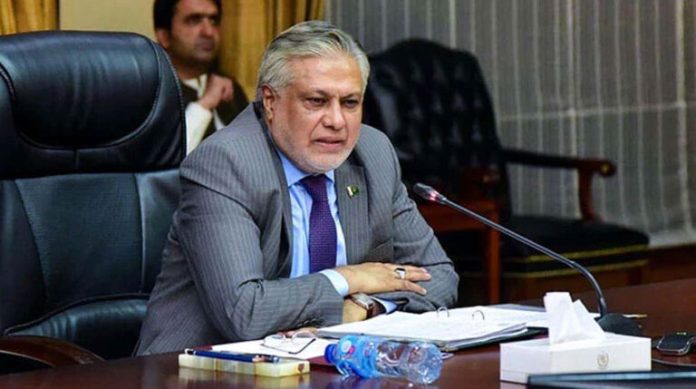—– Finance Minister says Election Act to be amended for enabling Interim PM to make important decisions
—– Dar believes not ‘appropriate’ to spend 3 months on routine decisions
—– Reveals ‘our experience of the past has not been very good’
—– Parliament likely to adopt Electoral Reform Bill this week
DM Monitoring
ISLAMABAD: Finance Minister Ishaq Dar said the Election Act 2017 will be amended to enable the interim ruler to make important decisions.
During an interview with a local television channel on Monday, Dar — when asked if section 230 of the election law would be amended — replied in the affirmative and said the country could not be handed over to a government for day-to-day decisions.
He further said the matter need not be hidden from people since they would find out anyways.
Moreover, he said: “but I think that whoever takes on this responsibility, it would not be appropriate to spend three months of the nation on day-to-day decisions.”
“Our experience of the past has not been very good.” According to the details, after reaching a consensus, the government is taking other political parties into confidence.
Agencies reported that the finance minister is also acceptable to the establishment as interim PM; however, during the television programme, Dar said it was too “premature” to say he would be selected.
“Yes, I saw those reports today as a basic Muslim, I believe that you should not aspire to any office yourself, nor should you chase it or lobby for it”. He further said it was “premature” to say he had been selected for the role, adding that a proper Constitutional process would have to be triggered.
When asked if there was a consensus on his name, Dar said that his record shows he always did his job to the best of his capability.
Meanwhile, the two houses of the Parliament would separately adopt the Electoral Reforms Bill introducing major changes to the Election Act-2017 this week. The proposed reforms would enhance the powers of the caretaker government to transact important matters of national significance, much beyond day-to-day affairs.
The amendments in the act would strengthen the Election Commission of Pakistan (ECP) further for holding free, fair and transparent elections.
A comprehensive bill would be approved by the federal cabinet in its meeting early this week and would be tabled in the National Assembly by Law and Justice Minister Senator Muhammad Azam Nazir Tarar.
Agencies added that the amendments in the act will pass by Senate by the end of the week.
Some reports in the media also pointed out that the law would enable the caretaker government to act like an elected government in dealing with international affairs and could act in a sovereign manner thereof.
The caretakers would entertain the provincial issues in the way an elected government could deal, including fiscal matters.
The committee constituted by National Assembly Speaker Raja Pervez Ashraf under former NA speaker Sardar Ayaz Sadiq has compiled its recommendations, which have been given to the government for further action.
Sadiq held a marathon closed-door session of the committee and approved the bill for reforms.
The agencies said that the laws and rules about the scrutiny of the candidates would adhere to exceptional strictness in the upcoming polls so that no undesirable person could reach the Parliament or provincial assembly.
The bill will also accommodate the recommendations of Chief Election Commissioner (CEC) Sikandar Sultan Raja, who earlier asked to grant the Commission powers to take certain actions.
He reminded the government the conduct of elections is dependent upon the necessary arrangements to be made by the commission to ensure that the “standards of honesty, justness, fairness provided in Article 218(2) are met”.
The CEC mentioned that the electoral body has consistently strived to uphold the writ of law, fair play, and merit in letter and spirit.
However, he reminded that the commission’s writ had been systematically challenged several times.
“In practice, ECP’s authority has been eroded,” the letter stated. The chief election commissioner, in his letters, wrote about the ECP’s crucial disciplinary interventions in the past, which were stayed and set aside, gaving wayward functionaries the message of hiding behind legal orders despite committing “serious level irregularities in discharge of their official functions”.
He recalled that the ECP’s writ was severely compromised at the time. A report said the parliament has already addressed the commission’s recommendations through legislation in the past few weeks.



